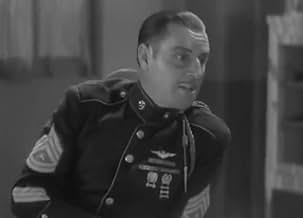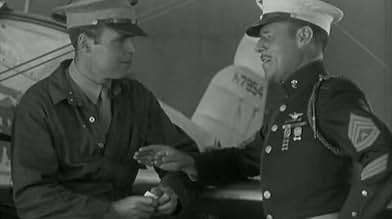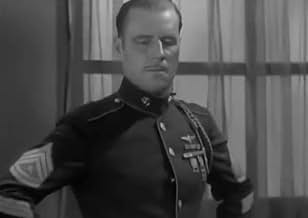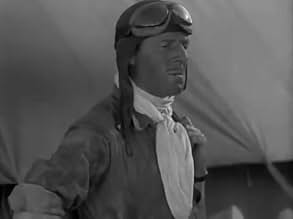A Marine flyer and his flight school mentor fall for the same beautiful nurse.A Marine flyer and his flight school mentor fall for the same beautiful nurse.A Marine flyer and his flight school mentor fall for the same beautiful nurse.
Harold Goodwin
- Steve Roberts
- (as Harald Goodwin)
Joe Bordeaux
- Marine
- (uncredited)
Walter Brennan
- Marine Pilot
- (uncredited)
Eddy Chandler
- Marine Sergeant - Panama's Buddy
- (uncredited)
Edgar Dearing
- Football Coach
- (uncredited)
George Irving
- Marine Colonel in Nicaragua
- (uncredited)
- Director
- Writers
- All cast & crew
- Production, box office & more at IMDbPro
Storyline
Did you know
- TriviaThe wrong-way run was based on the infamous play by Roy Riegels of the University of California in the 1929 Rose Bowl. With the score 0-0 in the second quarter, Riegels recovered a Georgia Tech fumble at the Yellow Jackets' 30, but he somehow got turned the wrong way and ran 65 yards toward his own goal line. A teammate grabbed him, but he was dropped at his own 1. The Golden Bears elected to punt, the punt was blocked out of the end zone for a safety touch and the two points provided the margin of victory in Georgia Tech's 8-7 win. The movie uses actual footage of Riegels from the game.
- GoofsWhen Lefty Phelps is polishing an aircraft, Sergeant Williams calls to him by yelling "Hey, soldier!" As both men are US Marines, the sergeant would not have addressed him that way. Soldiers are members of the US Army and a Marine would actually consider that remark to be an insult.
- Quotes
Steve Roberts: [On the Nicaraguan rebels] You know damn well what's going to happen if these people come along and catch you alive.
- ConnectionsFeatured in Frank Capra, il était une fois l'Amérique (2020)
- SoundtracksMy Mammy
(1921) (uncredited)
Music by Walter Donaldson
Lyrics by Sam Lewis and Joe Young
Sung a bit a cappella by Ralph Graves
Featured review
Charles Lindbergh's solo flight across the Atlantic in 1927 catapulted him into celebrity, and made aviators the ultimate American heroes of the late 1920s. Hollywood reflected this in a series of aviation-themed movies, most notably the first Best Picture Academy Award winner Wings, but also in the Howard Hughes extravaganza Hell's Angels and the Howard Hawks-directed Dawn Patrol. A lesser-known entry is this early talkie, simply titled "Flight".
Being of the first wave of sound pictures, Flight is a somewhat awkward production. The sound is of rather fuzzy quality, and the dialogue a little stilted. The three lead actors however, all veterans of the silent era, make the transition fairly well. They had worked together before and the rapport between them is believably strong. Ralph Graves (who also wrote the screenplay) is easily the least interesting of them, but he still has an easygoing charm and realism to him, and reminds me a little of Fred MacMurray. I particularly like his sarcastic "hooray" when he is assigned as a mechanic. Jack Holt makes a loveably gruff sergeant and fatherly mentor to Graves, and he is responsible for building up the movie's atmosphere of rough-edged friendliness. Lila Lee was a popular star in the silents, and her voice and manner adapt well to the new format. Like many leading ladies of this period however she would not maintain her success past a certain age and would soon be retiring to private life.
The director is a youthful Frank Capra, making his talkie debut. Capra's silents were typically marked with an obvious desire to make his mark with lots of attention-grabbing set-ups. By this point he is starting to settle down a bit and a more serious style is beginning to emerge. The opening shot, where the commentator's head looms over half the screen and the later cantina scene where various faces mill about in the foreground betray a love of a certain look, but also point towards a technique Capra would later perfect, that is of having the camera amid the action as if it was a person on the set. Capra also uses appropriate distances for dialogue scenes, as oppose to many early sound features where the actors were placed too far back while they were talking, giving an unnatural effect. There are however a few clunky moments; a quick dolly-in on a bucket is reminiscent of Capra's overdone slapstick comedies. His biggest weak point however seems to be action, and it appears that the fighting scenes in Flight were largely rescued in the editing suite.
And it appears that, in spite of the title, the emphasis on flying in this movie isn't as pronounced as it could be. Wings, Hell's Angels and Dawn Patrol all strove to give us viewers a taste of the thrill of being airborne. Here however Capra alternates between rather bland stock-footage like shots of planes in flight and reaction shots of the men on board. But you see Flight is more about the camaraderie and self-sacrifice of military life. The plot may be a rather predictable love triangle between friends affair, and a little more pizazz in the action scenes might have given more of a sense of danger to their circumstances, but as it is this is a worthy attempt which points towards the more technically modest yet dramatically powerful movies of 1930s Hollywood.
Being of the first wave of sound pictures, Flight is a somewhat awkward production. The sound is of rather fuzzy quality, and the dialogue a little stilted. The three lead actors however, all veterans of the silent era, make the transition fairly well. They had worked together before and the rapport between them is believably strong. Ralph Graves (who also wrote the screenplay) is easily the least interesting of them, but he still has an easygoing charm and realism to him, and reminds me a little of Fred MacMurray. I particularly like his sarcastic "hooray" when he is assigned as a mechanic. Jack Holt makes a loveably gruff sergeant and fatherly mentor to Graves, and he is responsible for building up the movie's atmosphere of rough-edged friendliness. Lila Lee was a popular star in the silents, and her voice and manner adapt well to the new format. Like many leading ladies of this period however she would not maintain her success past a certain age and would soon be retiring to private life.
The director is a youthful Frank Capra, making his talkie debut. Capra's silents were typically marked with an obvious desire to make his mark with lots of attention-grabbing set-ups. By this point he is starting to settle down a bit and a more serious style is beginning to emerge. The opening shot, where the commentator's head looms over half the screen and the later cantina scene where various faces mill about in the foreground betray a love of a certain look, but also point towards a technique Capra would later perfect, that is of having the camera amid the action as if it was a person on the set. Capra also uses appropriate distances for dialogue scenes, as oppose to many early sound features where the actors were placed too far back while they were talking, giving an unnatural effect. There are however a few clunky moments; a quick dolly-in on a bucket is reminiscent of Capra's overdone slapstick comedies. His biggest weak point however seems to be action, and it appears that the fighting scenes in Flight were largely rescued in the editing suite.
And it appears that, in spite of the title, the emphasis on flying in this movie isn't as pronounced as it could be. Wings, Hell's Angels and Dawn Patrol all strove to give us viewers a taste of the thrill of being airborne. Here however Capra alternates between rather bland stock-footage like shots of planes in flight and reaction shots of the men on board. But you see Flight is more about the camaraderie and self-sacrifice of military life. The plot may be a rather predictable love triangle between friends affair, and a little more pizazz in the action scenes might have given more of a sense of danger to their circumstances, but as it is this is a worthy attempt which points towards the more technically modest yet dramatically powerful movies of 1930s Hollywood.
Details
- Release date
- Country of origin
- Language
- Also known as
- Kartalların Avdeti
- Filming locations
- Production company
- See more company credits at IMDbPro
- Runtime1 hour 50 minutes
- Color
Contribute to this page
Suggest an edit or add missing content





























